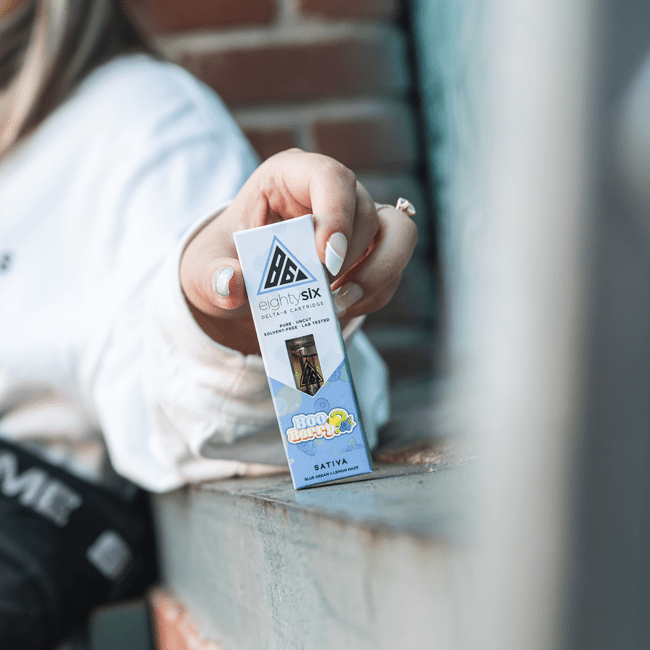Disclaimer - please do not use this blog as any legal advice. Legality of delta-8 THC remains unclear, particularly as state governments may exercise different regulations regarding the cannabinoid. Please refer to your legal counsel and state laws.
Do you know about the benefits of Delta-8 THC? You may have heard of Delta-8 THC before, or you may be wondering how it could help you now. Either way, our guide will answer some of the most important questions about the compound. With its popularity surging, it's time to get the facts straight about the cannabinoid so you can be fully informed.
Let's dive into everything you need to know about Delta-8 THC, including its legality, benefits, what to expect from using it, and so much more.
What Is Delta-8 THC?
To understand Delta-8 THC’s benefits, you need to know where it comes from and what it does. Delta-8 THC exists naturally in cannabis plants, though it’s not as plentiful as its sister compound, Delta-9 THC. It's a naturally-occurring cannabinoid, but it can also be produced by converting CBD or Delta-9 THC through solvents, altered pH environments, catalysts, or the most common method, heat.
We know that Delta-8 is found less abundantly in most cannabis plants; that's why labs and extractors utilize molecular isolation methods and selective breeding to extract concentrates that are more abundant in the compound.
Delta-8 THC offers a mix of the features that are common in both CBD and Delta-9 THC — some might say the best of both worlds. While it doesn't provide the typical "high" associated with Delta-9, it is mildly psychotropic. It also appears to have more potential benefits overall than Delta-9, given that many of the negative side effects commonly reported with Delta-9 aren’t experienced when using Delta-8.
Delta-8 THC exists in an "activated" state as an extremely viscous oil. This is similar to Delta-9 THC in that it doesn’t need to be decarboxylated further to feel the effects.
Potential Benefits of Delta-8 THC
While the relative newness of Delta-8 THC leaves us with limited research, let's run through what has been discovered so far. A 1995 study described Delta-8 THC in its results as having a lower psychotropic potency than Delta-9 THC. The study was performed on children between the ages of three and thirteen, each with hematologic cancer. Delta-8 THC helped reduce symptoms related to nausea with no significant side effects. The children undergoing such treatment saw a 100% success rate across 480 treatments.
Some research also suggests that Delta-8 THC could produce Acetylcholine, which is a neurotransmitter responsible for memory, cognition, neuroplasticity, and even arousal. That's a lot of benefits for something that appears to have close to or zero side effects.
One of the most important developments regarding the potential wellness benefits behind Delta-8 THC are its inherent properties similar to both CBD and Delta-9 THC. According to a report published on MedGen, Delta-8 is described as "an analogue of tetrahydrocannabinol (THC) with antiemetic, anxiolytic, analgesic, and neuroprotective properties." Sound familiar? That means it may have a variety of wellness benefits.
What to Expect When You Take Delta-8 THC
Does Delta-8 THC Get You High?
While Delta-8 is psychoactive, it bonds to our endocannabinoid system differently than Delta-9 does, so it is less potent overall. Instead of feeling "high" like someone would on traditional cannabis products, users of Delta-8 products — like our gummies and vape cartridges — report feeling more clearheaded, focused, and energized. They feel a surge of calm like being stoned but without the total couch potato experience.
Keep in mind, you can still expect a "high," but not the same high that is felt from Delta-9 THC. This is a high that keeps you in control without the negative side effects some users report with Delta-9. Many liken Delta-8 THC’s benefits to the fun of being high on traditional THC without the paranoia, lethargy, or worried feelings certain people experience when smoking.
Delta-8 THC's Legality

Before the DEA's August 2020 addendum of the 2018 Farm Bill, it was legally unclear whether Delta-8 was considered part of the Controlled Substances Act. As of this past August, the agency updated the bill to include the cannabinoid on the Controlled Substances list. While this explicitly states the illegality of Delta-8, the 2018 Farm Bill expressly carved out "tetrahydrocannabinols in hemp." This means that, while there are further limitations in some states, hemp-derived Delta-8 THC is perfectly legal.
While the USDA probably didn’t intend to create a loophole for people to get high, it does mean that more people have access to Delta-8 THC across the nation. The focus of the bill was hemp that has Delta-9 THC in it, so Delta-8 may be under the radar for the time being.
So, is one of Delta-8 THC’s benefits its legality? In most states, yes, as long as it's derived from hemp. In some states, marijuana-derived Delta-8 THC is also legal. It is, however, important to check what the laws are for your state and area. Some states have more restrictive laws, so do keep that in mind.
What Is the Difference Between Delta-8 and Delta-9 THC?


The differences between Delta-8 and Delta-9 are both very minor yet very major. The major differences boil down to the location of the specific bond that each THC molecule binds to. Delta-8 THC has a double-bond on the eighth carbon chain, while Delta-9 THC has a double-bond on the ninth carbon chain. This subtle yet important change is what researchers believe creates different reactions when using the two types of THC.
Likewise, it appears that while both types of THC bind to the CB1 receptor of our endocannabinoid system, Delta-9 has an affinity to bind three times better than Delta-8. It is this intensity that may cause the negative side effects associated with Delta-9.
So, binding less intensely to the CB1 receptor in the brain and having a double-bond on the eighth carbon chain instead of the ninth may be the necessary difference. This difference allows Delta-8 to provide several benefits that come with THC minus the negative symptoms and side effects.
What About the Difference Between Delta-8 THC and CBD?
So, how is Delta-8 different from CBD if it doesn't cause the negative symptoms that Delta-9 does? Well, Delta-8 is more psychotropic than CBD, for starters. CBD is known as non-psychoactive and non-psychotropic, while Delta-8 merely has less of a psychoactive effect than Delta-9.
CBD, or cannabidiol, is more reputable than THC, but only in recent years. Before the 2018 Farm Bill, CBD wasn't as widely known, and it certainly didn't have the positive reputation it does now. After the 2018 Farm Bill, CBD became widely accessible across the nation, giving way to a massive surge in popularity as hemp-derived and third-party lab-tested CBD products hit the shelves.
The biggest difference between Delta-8 THC and CBD is their psychoactive potential. They're both safe, they're both derived from hemp, but you won't feel "high" from CBD. With Delta-8, you get to experience the high of THC with the benefits from CBD, all rolled into one cannabinoid.
Now, you're probably thinking, "why would I choose Delta-8 THC products and get even a little high, when I can just take CBD and feel all of its benefits without ANY psychoactive elements?" That's a fair question! While CBD is much more prevalent these days, the simple truth of the matter is that Delta-8 THC products simply provide these effects BETTER than CBD thanks to its interactions with the endocannabinoid system.
As we mentioned previously, Delta-8 THC interacts with our endocannabinoid system. Unlike CBD and traditional THC, however, Delta-8 THC interacts with BOTH the CB1 and CB2 receptors. This effectively captures the "best of both worlds,” combining the elements of CBD with a less-intense version of Delta-9 THC’s psychotropic effects.
Who Could Use Delta-8 THC?
Many people could take advantage of the benefits of delta-8 THC, but it looks like it could also fill the needs of a unique niche segment of the market. For those that enjoy and use CBD for overall wellness without the often-debilitating effects traditional THC exhibits, Delta-8 might be the answer. It's the mild feeling of being high without the impaired cognitive functions and massive lethargy.
Try Delta-8 THC Today
We hope we've been able to uncover all the answers to questions you might have had about Delta-8 THC. We’ve explored its potential benefits to us, its legality within the United States, and comparisons between Delta-8 and both CBD and Delta-9 THC.
Have you tried our Delta-8 THC cartridges yet? We'd love to hear about your experience!
Boo Berry
A delicious, sweet blueberry pie topped with blueberries delivering a burst of energy during the initial onset followed by feelings of creativity.
Cookie Monsta
Tasting like a sweet, earthy, and floral cookie, this in-your-face body high is paired with an electrifying finish that keeps you in limbo between happy, creative, and relaxed.
Cereal Killer OG
This energetic bowl of the iconic cereal starts you off with a relaxing and calm body buzz before blasting you off into a euphoric bout of creativity.
SHOP NOW 
Grape Soda
A fruity medley of earthy blueberries paired with plump grapes deliver a heavy-handed high as your body sinks further and further into a state of deep relaxation.
Berry Slush
This strain of sweet strawberry goodness delivers a cerebral and uplifting aura that keeps you productive, creative, and energetic.
SHOP NOW


